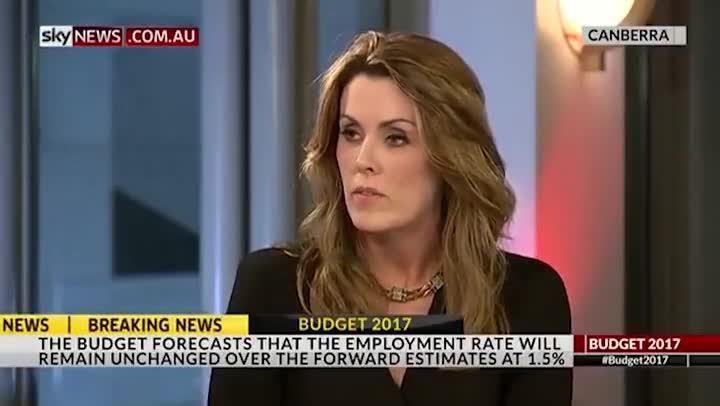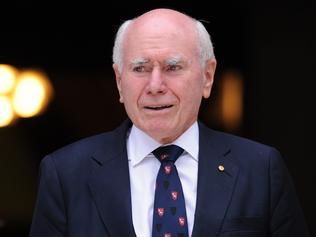
When they come to write the history of conservative governments in this country, the 2017-18 budget will be a defining moment.
Last night, the Howard-Costello era ended.
In its place, Malcolm Turnbull and Scott Morrison delivered a budget that owes more to the ghost of Labor leaders past than it does to Liberal fundamentals of debt reduction, prudent spending, lower taxes and smaller government.
• LIVE COVERAGE: Budget 2017 reaction
The last time I was in a budget lockup was May 14, 2013, when Wayne Swan delivered the ALP’s final budget before Tony Abbott’s landslide win. It was vintage Labor and the language of his speech, heavily workshopped by focus groups, hit every pre-election constituency with a mention, a win and a (taxpayer-funded) boost. Working through Scott Morrison’s effort last night, the same focus group work was evident with carefully calibrated phrases designed to win over the voters that have deserted the Coalition in droves.
It was all there: fairness, security and opportunity, over and over again. Not only did it take on board the Medicare fights of last year’s campaign but also the seismic shocks delivered to centre-right politics across the globe; Brexit, Trump and voter dislocation all made their way to Canberra as the Coalition sought to assure voters that, while the economy might be in its 26th year of consecutive growth, people feeling left behind were not forgotten.
But this was no “forgotten people’s speech”. It was short on Liberal values and long on survival instincts for a Prime Minister who staked his claim on the top job with a pledge to arrest declining polls and drive home an economic narrative.
Last night the Turnbull government took a gamble on a budget reset away from debt reduction and deficit repair towards higher taxes, new taxes and a heavy measure of infrastructure, education and health sector spending.
On more than one occasion I flipped the cover over to check I wasn’t re-reading a copy of Swan’s effort last time I was in the lockup. Yes, this was a Liberal budget paper but nothing like I had read before.
The government’s budget strategists will argue that polling popularity was a higher cause but failing to seize the opportunity for serious budget reform on the spending side is a loss for us all.
What the same Liberal strategists also missed in their quest to protect the Prime Minister’s grip on the Lodge is that the Coalition base has shifted away from the government for what it’s failed to do, as much as it has shifted for what it’s done.
Conservative voters, especially the growing numbers of older Australians moving their vote away from the Coalition, want to see a government take the tough but necessary decisions for the future. The brutal truth confirmed in last night’s budget is that if a Liberal government has given up on debt and deficit, what hope is there, especially with the growing risk of a Shorten win at the next election?
TIMELINE: A history of the federal budget
With a one-seat majority, trying to neutralise Labor by becoming Labor with a budget heavy on tax and spend, with plenty of punishment for public enemy No 1, the banks, is a dangerous course.
Trying to sell the bank hit as a levy is a lie. It is a tax and everyone can see it for what it is.
Excuses that it is a better tax than Labor’s because it doesn’t hit smaller deposit holders like Swan’s scheme don’t address the fundamental problem that taxing private business just because it makes a decent profit is the Labor way, not what conservatives do.
The new accountability regime for banks and their executives smacks of the heavy-handed regulation that’s always been an anathema for the centre-right side of politics.
I will be interested to listen to the arguments from the Turnbull government frontbenchers as they argue for their new banking tax.
I haven’t forgotten their vociferous opposition to such a move when Labor tried it on a few years back.
Ditto with the Turnbull government’s lazy increase to the Medicare levy that’s designed to fully fund the NDIS. When Julia Gillard last proposed a 0.5 per cent increase to cover the costs of the NDIS, the Coalition only agreed to support it with the promise this would meet all future costs. I didn’t buy the “fully funded” line last time and I don’t buy it now.
Just look at Gonski — the “ghost of Gillard” looms large in this budget as the Coalition falls into the trap of paying for Labor’s 10-year promises that they never funded themselves.
Trying to outspend Labor is an unwinnable race to the bottom for the Coalition side of politics. The missed opportunity to do more with the budget knife has meant only a paper-thin surplus of $7.6 billion (0.4 per cent of GDP) in 2019-20. Voters on the left just expect big-spending government so you don’t win or hold their support. The right are only made nervous when the country spends big and no amount of declaring that government must live within its means makes it so.
Big government, more quangos and the commonwealth government building and owning infrastructure is a long way from the Howard-Costello DNA.
But after years where the states have failed to invest in the infrastructure needed to ease congestion in our cities, as well as revitalise regional communities, the budget’s commitment is commendable, provided spending is scrutinised to avoid waste and private players are not displaced.
After a 14-seat loss and months struggling in the polls ever since, it’s clear the Turnbull government has elected to take its focus off the nation’s bottom line and turn it towards the polls. Survival is everything in politics, that’s for sure, but so are principles.
Peta Credlin is a Sky News commentator and a columnist for The Sunday Telegraph







To join the conversation, please log in. Don't have an account? Register
Join the conversation, you are commenting as Logout